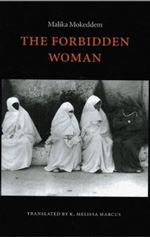

Univ. of Nebraska Press, paperback, 9780803282407
As readers, we crave a story whose content and execution work together seamlessly to draw us in. Yet we don't always get all we want, and the question arises: when all is said and done, what tips the balance and makes us glad we have read a book? Malika Mokeddem's third novel, The Forbidden Woman, raises that question for me. While there may be as many answers as there are books, one criterion in judging a work is surely what stays with us after our first reactions have faded. By that measure, I am glad I read this book.
In this story, whose protagonist seems to be drawn completely from the author's own life, Sultana Medjahed is a physician, living and practicing in France. She is also a native-born Algerian, raised in the poor section—the mud-walled ksar—of a remote village. Now she is returning to her home village for the funeral of a friend and former lover, a physician at the village's clinic. In so doing, she is returning to a country, a culture, and, most of all, a mindset in which misogyny rides on the coattails of religious zealotry. As Sultana steps off the plane, she is struck by the enormity of what she fled in contempt and fear and now must face once again. She knows that her own revulsion will be mirrored back at her by the Algerian man. He will look at her Western dress, at her education; he will see her unaccompanied and independent; and he will draw his own conclusions based upon a lifetime of having "never learned what a caress is … never learned to love."
Early on, Mokeddem assails the reader with this bidirectional and unbridgeable anger:
I start. 'Whore!' More than the sorrowful spectacle of the street …this word drives Algeria into me like a knife. Whore! How many times as an adolescent, still a virgin and already wounded, did I have this word vomited into my innocence.
…
Our eyes are glued to each other… Mine defy him, tell him how vile he is. He's first to lower his eyes.
While Mokeddem's anger radiates outward as the narrative progresses, expanding to encompass the impact of the "gangrenous mentality" of the culture on children (even boys), the destruction of the educational system, and the ethnic policies of the government, it never really moves far from its original focus. As the story line builds to its final confrontation, there is no sense that resolution or compromise is coming. The positions of the characters seem to crystallize and harden; although they are not completely divided on gender lines, they are wholly focused on gender lines. The depiction is sharp and compelling.
From my viewpoint, however, the story is somewhat marred by the way it is told. Mokeddem's prose moves beyond lush into over-ripe. As her translator says, "If one…is averse to a plethora of descriptive adjectives and seemingly incongruous metaphors, one might consider Mokeddem's style excessive." I do. I think that perception and insight suffer at the hands of floridity. Moreover, I find the adolescent characters, who ponder on metaphysics, jarring. While Mokeddem may have intended them as an "out of the mouths of babes" literary device, the effect fails. Instead, they come across as overly precocious and interfere with the rhythm of the story. The thoughts they voice would have worked better in the mouths of adult characters.
Yet now, a week after having finished the story, I find that the author's anger and indignation have stuck with me, while my discomfort with her writing style has faded; it is not forgotten but is no longer particularly relevant. Mokeddem has moved me to feel something that isn't totally transitory: more than any other Algerian writer I've read, she has conveyed the fury and frustration of the gender divide in Algeria. In the end, therefore, regardless of whether I read another of her books, this novel is successful and worthwhile.
